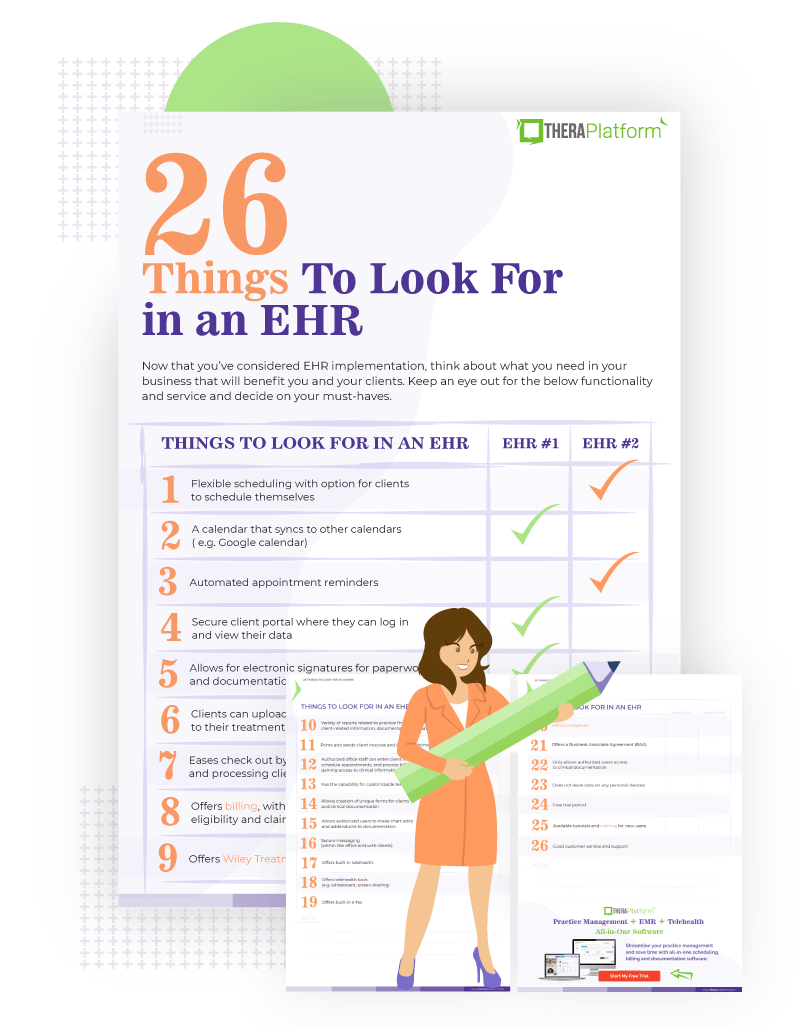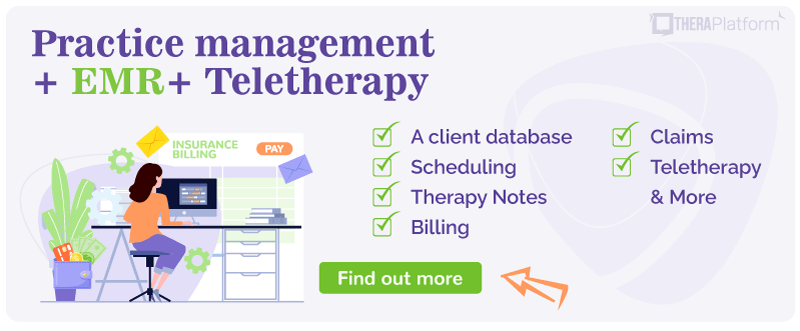Cloud-based EHR

A cloud based EHR or electronic health record is an item most therapists in private practice consider to maintain client data and documentation. There are many considerations when deciding to transition from paper charts to electronic health records. It can be a confusing time, especially with new lingo and terminology. One consideration is what type of EHR to use.
What is a cloud based EHR?
EHR systems fall into two types of categories. A client-server, or in-office EHR, stores data on site using servers, computer systems, and software that you purchase. The client-server system requires you to install and operate the program within your office location. You are also responsible for backing up the data and server as well as managing the technology and support necessary to operate the system.
A cloud based EHR uses external servers that store the client data entered in a cloud-based server in a remote location. You access the program with your computer (and usually the option of an app) via the internet. With a cloud based EHR, you would need a computer and accessible internet to operate the program. It does not require backups to a server on your premises or purchasing an entire program.
Will a cloud based EHR grow with my practice?
Most therapists begin a private practice smaller in size and then scale the practice. An individual practice may grow into a group practice. A niche may change. The practice may offer additional services. The practice may outgrow its current office space and expand into a new location. Cloud-based EHRs allow you to begin your usage with a lower package and smaller financial investment and then grow into a larger package as you scale the practice.
Regardless of how your practice grows, a cloud based EHR is scalable with your practice. Most cloud-based EHR systems offer monthly subscription packages. With these packages, you select the plan that best suits your needs. As you grow your practice and increase the needs for an EHR, you can select a different monthly subscription package.
EHRs have different offerings in the packages that might differ as you scale such as:
- Number of users
- Number of clients
- Treatment planning tools
- Number of participants in a telehealth session
What are the advantages of a cloud-based EHR?
When deciding about which type of EHR to implement in your practice, there are many advantages and benefits to consider with a cloud based EHR.
- Simple and easy to get started: To begin using a cloud-based EHR, you need to select your package, create your log-in, and then set up your account information. You do not have to install any hardware or software. Most cloud based EHRs are user-friendly and offer assistance to help you create your account and learn the software.
- Low cost: A cloud based EHR has a minimal investment. Client-server or in-house EHRs require purchasing expensive software, servers, licensing, maintenance, and often technical support. With a cloud-based server, you purchase your monthly subscription based on your practice needs, a computer, and internet connectivity. Because of this lower financial investment, you can quickly begin using the EHR system without having to pay high costs.
- Technical support: Most cloud based EHR programs offer technical support as part of their service. When you have questions, difficulties, or needs related to the EHR, technical support can guide you through any problems and answer questions. They often have video tutorials, support articles, live chat features with technical support, email contact with support, and telephone support.
- Automatic updates, back-ups, and security compliance: EHR software programs require ongoing maintenance such as updates to the software, back-ups to the server, security and code updates, and other technical-related tasks. Do not worry if you do not know what these tasks are or how to do them. With a cloud based EHR, you do not need to do any of these things or, pay an IT support person to manage them. The EHR software provider takes care of making sure the program runs smoothly and remains up to date.
- Secure access: Cloud-based servers offer encrypted and secure access to the program to approved users. Approved users can securely log into the software from any location with internet access. Users do not need to be on-site in the office to enter their data or access the health records of clients.
- HIPAA compliant: The data centers associated with a cloud-based server offer high-level security and data encryption. They continually monitor and update the security and encryption as necessary to ensure that EHR remains compliant with the highest level of HIPAA and cybersecurity standards.

Download our free EHR implementation checklist

What are the limitations of a cloud based EHR?
A cloud based EHRs can present some challenges at times to the practice:
- Learning the technology: As with anything new, users will need some time to learn the EHR software and how to navigate through the EHR to accomplish what needs to be done. Some people may feel intimidated by learning new software or transitioning from paper charts to an electronic health record. With some time and training, most users can gain comfort and confidence in learning how to use the EHR.
- Internet problems: Because cloud-based EHRs require internet access, they only work as well as your internet connection works. If the internet goes down, runs too slow, or you have no access at your location, you will have trouble using the EHR. It can help to create a policy for the practice regarding accessing the EHR and internet connectivity issues.
- Other technology issues: Technology problems are real and can happen at any time. Because the cloud-based EHR relies on technology that is not located in your office, you need to rely on the EHR provider to repair any issues. If a server has an access problem or another issue arises with the software, you may have difficulty accessing the EHR and need to wait for the provider to repair the issue. Most EHR companies communicate with users regarding known issues and when the problem has been resolved (usually by email).
What does a cloud based EHR cost?
Average monthly costs can vary across the different EHR providers. Most providers offer monthly packages with various features.
Prices often vary depending on:
- Number of clients
- Number of therapists users
- Number of administrative users
Most EHR providers offer additional features. Some of them may include these features in the monthly subscription while others may charge additional fees.
Features of EHRs like TheraPlatform may include:
- Telehealth platform
- Treatment planning tools (Ex.: Wiley treatment planner)
- Claims submission
- Credit card processing
- Appointment reminders
- Client portal
- Access to worksheets, guides, etc. for client treatment purposes
You should have relatively few costs in addition to the cost of the EHR subscription.
Some costs to consider in your budget include:
- Computers and any accessories
- Internet connectivity (make sure the speed is fast enough to account for the number of users)
- A professional IT expert to maintain your computers
Start 30-day Free Trial and explore TheraPlatform. HIPAA Compliant Video and Practice Management Software for Therapists.
Resources
A cloud based EHR offers the ability to transition smoothly with low financial investment to an electronic health record system for your practice. You can find the technical support needed to assist you with this implementation and ongoing maintenance of the EHR. A cloud based EHR like Theraplatform that also provides practice management and teletherapy, can simplify the documentation and health record maintenance of your practice which allows you more time to focus on treating your clients and building your practice successfully. TheraPlatform, an all-in-one EHR, practice management and teletherapy tool was built for therapists to help them save time on admin tasks. They also offer a free 30-day trial with no credit card required. Cancel anytime.





